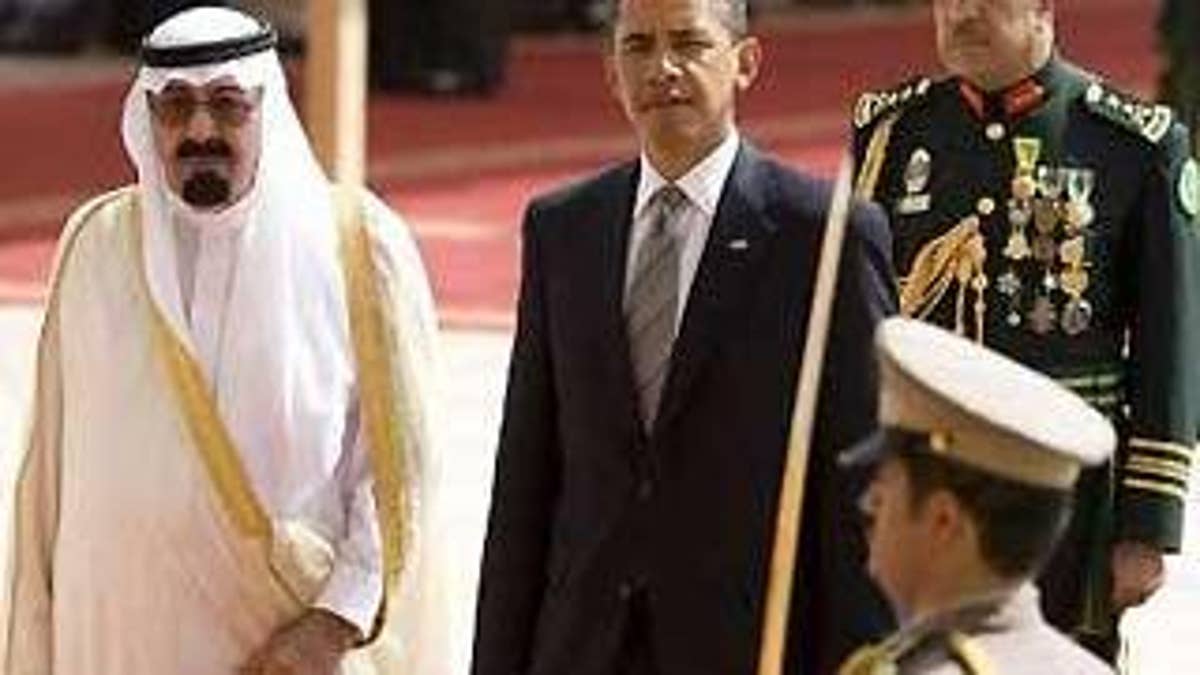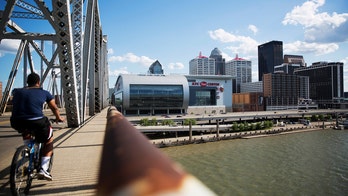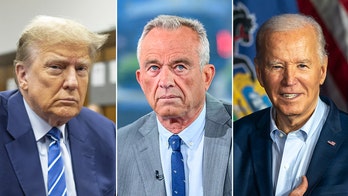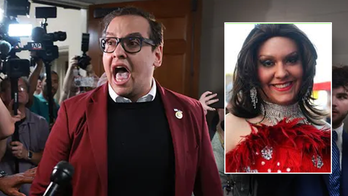
President Obama met with King Abdullah in the Saudi Arabian capital of Riyadh on Wednesday in his latest bid to open a dialogue with the Muslim world.
The two discussed a wide range of issues, including Middle East peace, the conflict in Afghanistan and Pakistan, energy, Iran and other issues affecting the region. They also discussed the president's upcoming speech to the Muslim world.
The Saudi monarch greeted Obama on the tarmac at Riyadh's main airport when the president arrived after an overnight flight from Washington. A band played "The Star-Spangled Banner."
Obama greeted the 84-year-old king with a handshake and a nod of the head -- forgoing the controversial bow he appeared to give the king at their first meeting in London in April. After that meeting, the White House denied that Obama had bowed, saying the president had bent over just to shake the king's hand.
Despite the 108-degree heat, the two men observed a 21-gun salute and conducted a review of troops before greeting each others' delegations. A gazebo protected them from the sun.
The king shook hands with members of Obama's entourage, but he did not hold the president's hand as he famously did with Obama's predecessor, George W. Bush, during a trip to the region.
Perched on ornate chairs behind a flower arrangement, Obama and Abdullah then chatted briefly in public and shook hands, with cameras capturing the scene. Then, they retreated to hold private talks on a range of issues.
Obama will spend the night at the King's horse ranch just outside of Riyadh where the two leaders are expected to discuss the Middle East peace process, Iran's nuclear ambitions and the rising price of oil. The two proceeded to the ranch, where they were greeted by riders in full Saudi garb.
"The United States and Saudi Arabia have a long history of friendship. We have a strategic relationship," Obama said as he visited the monarch's desert horse farm. The U.S. president called Abdullah wise and gracious, adding: "I am confident that working together that the United States and Saudi Arabia can make progress on a whole host of issues of mutual interest."
In turn, Abdullah expressed his "best wishes to the friendly American people who are represented by a distinguished man who deserves to be in this position."
The president will next travel to Cairo, where he plans to deliver a speech that he's been promising since last year's election campaign -- aiming to set a new tone in America's often-strained dealings with the world's 1.5 billion Muslims.
Many of those Muslims still smolder over Iraq, Guantanamo and America's unflinching support of Israel, but they are hoping the son of a Kenyan Muslim who lived part of his childhood in Indonesia, the world's most populous Muslim country, can help chart a new course.
"You know, there are misapprehensions about the West, on the part of the Muslim world," Obama said in an interview he gave to the BBC before he left Washington. "And, obviously, there are some big misapprehensions about the Muslim world when it comes to those of us in the West."
Aides cautioned that Obama was not out to break new policy ground in his Cairo speech, which follows visits to Turkey and Iraq in April and a series of outreach efforts including a Persian New Year video and a student town hall in Ankara. And they said the president is not expecting quick results, even though the speech will be distributed as widely as possible.
"We don't expect that everything will change after one speech," White House spokesman Robert Gibbs said Tuesday. "I think it will take a sustained effort and that's what the president is in for."
Officials said Obama also wouldn't flinch from difficult topics, whether it's the wars in Iraq and Afghanistan, the goal of a Palestinian state or democracy and human rights. Obama has been criticized for setting the address in Egypt, where President Hosni Mubarak has jailed dissidents and clung to power for nearly three decades.
In Riyadh, the president was talking to Abdullah about a host of thorny problems, from Arab-Israeli peace efforts to Iran's nuclear program. The Saudis have voiced growing concerns in private that an Iranian bomb could unleash a nuclear arms race in the region.
In the days before departing on his trip, Obama told reporters he would be "very honest" with Abdullah, saying that he was going to mention that "we're not going to be eliminating our need for oil imports in the immediate future; that's not our goal. What our goal has to be is to advance the clean energy solutions in this country that can strengthen the economy, put people back to work, diversify our energy sources."
The surge in oil prices also was on the agenda. Crude topped $68 a barrel this week, sparking fears that a fresh jump in energy costs could snuff out early sparks of a recovery from a deep global slump.
Obama likely will be looking for help from Saudi Arabia on what to do with some 100 Yemeni detainees locked up in the Guantanamo Bay prison. Discussions over where to send the Yemenis have complicated Obama's plan to close the prison. The U.S. has been hesitant to send them home because of Yemen's history of either releasing extremists or allowing them to escape from prison.
Instead, the Obama administration has been negotiating with Saudi Arabia and Yemen for months to send them to Saudi terrorist rehabilitation centers.
In any effort to court Muslims, the Saudis will be key -- not just for their oil wealth, but by virtue of the authority they wield at the center of Arab history and culture.
Obama's meeting with the king is his second in three months. The two saw each other at the G-20 summit in London, a meeting both sides called friendly and productive.
"This in many ways will be one of the pivotal relationships President Obama can develop," said Robin Wright, a scholar at the Woodrow Wilson Center. "Saudi Arabia is important not just in terms of the Gulf and oil prices. It sets the tenor. It's one of the most conservative regimes. It's also important because King Abdullah is, among the various royals, more open-minded than others. These are two men who might actually deal well with each other."
FOX News' Daniela Sicuranza and the Associated Press contributed to this report.




